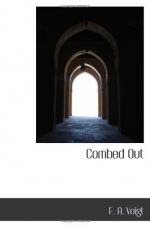At last the whistle blew and we fell in. The sky was still covered with dark, heavy clouds, but the snow had ceased to fall and the wind had dropped. We could see the dreary landscape a little better now. The railway lines curved away until, in the far distance, they ran into a ghostly procession of tall, slim poplars that filed across the dim horizon and marked the passage of a main road. On one side of the lines long rows of dark squares in the snow showed where the sleepers had lain before we moved them. A brown stretch of churned and trodden mud and water connected them with the new stacks that extended in four rows along the other side of the lines. We had shifted five thousand eight hundred sleepers in all. Around us were level, snow-covered fields unrelieved by anything except an occasional tree and the farm. It consisted of three buildings, a house and two big barns, forming three sides of a square. The cottage had a low, thatched roof, dirty, whitewashed walls, and green shutters. In the middle of the square was a huge muck heap, covered with patches of melting snow. A pig was pushing its snout into it here and there and grunting from time to time. There was no other sign of life anywhere. A dreary, depressing landscape!
“Remember Belgium!” said one of the men in the ranks derisively.
“We won’t forget it in a hurry!”
“Fritz can have it for all I care!”
“He’s welcome to it—I don’t want it, I want to get back to Blighty!”
We were called to attention. The promised lorries were waiting for us—three lorries for eighty men. We marched towards them in file, but as we got nearer to them, the men broke rank and everybody rushed wildly to get in first so as to secure any available boxes or petrol-tins that might serve as seats. A noisy, turbulent throng clustered round each lorry. We scrambled in, pushing, hustling, and swearing. We were soon so crowded together that there seemed to be no room for any more, but nevertheless more men climbed up and forced an entrance. We formed a compact mass and our picks and shovels were heaped on the floor in everybody’s way.
The lorries started with a lurch so that we all staggered backwards. They raced along, and bumped, and swayed from side to side. The roof of the lorry in which I stood was so low that I had to keep my head bent forward all the time. The fumes from the exhaust made our eyes water and smart.
We reached camp after about half an hour’s ride. We jumped out and lined up on the road. Sergeant Hyndman perceived the Commanding Officer strolling about amongst the tents and said to us in an awe-stricken voice:
“Smarten up a bit, for Christ’s sake—there’s the Captin walkin’ about—don’t make no bloomers when yer dismissin’ else yer’ll get extra shovel-drill an’ get me into trouble in the bargin. Mind yer salute prop’ly.... Party—Tshn! Inter File, Right Turn! Quick March!”




